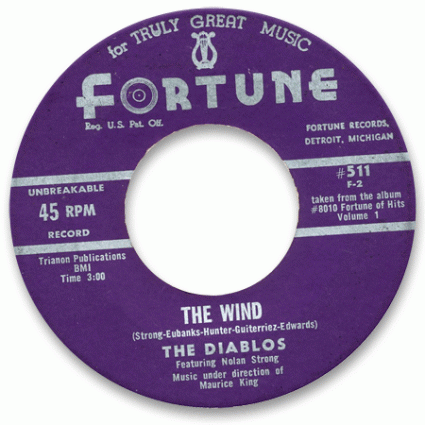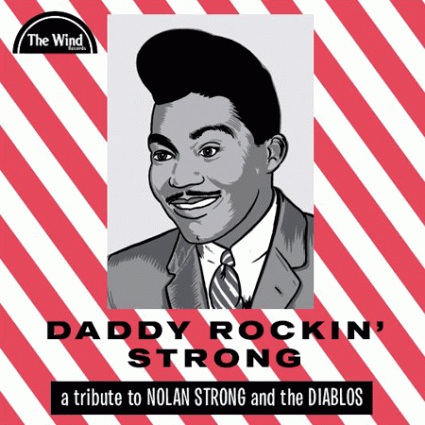
In 1954 Nolan Strong & the Diablos recorded one of the great doo wop singles, “The Wind” b/w ”Baby Be Mine.” For years it’s skirted under the radar as a pleasure known by far too few. But this Detroit group impacted two generations of Motown glory, and there is no time like the present to spread the word on this neglected classic.
It’s true that one of the perks of the CD era was the steady proliferation of box-sets, a development that was spurred by both a healthy economy and a general increase in consumer interest in having hefty chunks of music history loaded into their stereo system’s multi-disc changers. Yes, vinyl box sets weren’t uncommon, but in reality labels tended to shy away from subjects that required more than three or four LPs. Often they just broke them down into individual volumes, where most buyers reliably purchased the first few entries and left the subsequent installments (which is reliably where some of the best stuff was found) for those branded as “obsessive.”
This box-set boom included everything from Columbia’s 4-disc Roots ‘N’ Blues Retrospective collection, MCA’s generous stream of single artist and compilation sets procured from the vaults of Chess Records, Polydor’s Star Time, a 4-disc study of James Brown, and maybe the granddaddy of them all, Atlantic’s 9-disc The Complete Stax/Volt Singles 1959-1968. Naturally, Rhino Records got into the act with gusto, producing three 4-disc sets of garage-rock in the Nuggets series and a 4-disc collection of vocal group harmony titled The Doo Wop Box that was so successful it inspired two additional volumes.
Doo-wop was particularly ripe for anthologizing, since so much of the genre was about one-hit wonders and obscure classics from groups that recorded a couple of sides at best before breaking up. To my knowledge the LP era was basically bereft of any serious attempts to house the essence of doo-wop’s rich history into box-set form; instead there were a ton of single LP collections, but they frequently lacked much in the way historical focus, oozing mercenary intentions as hit songs took up space on numerous different albums, crowding out lesser known material purely in the interest of sales.
Part of the reason for doo-wop’s neglect resides in how it lacks what some would call an alluring back-story, especially in the genre’s relationship to the 1950s, a decade that’s still generalized as being plagued with conformity. Where much of the era’s jazz was the soundtrack to the hipster life, R&B was a subversive sound that made uncomfortable the white and uptight, and original rock ‘n’ roll was seen as an act of rebellion even if it largely lacked a specific ideology, doo-wop was and to an extent still is (and not even incorrectly) considered a reflection of the status quo. It was the stuff of making out, of hanging at the malt shop, of tuning in a crackly radio and then slowly drifting off to sleep and pleasant dreams.
And if pegged as safe, doo-wop also shouldered a rep as being an enjoyable but stylistically limited sound, the style working best when sampled in tandem with R&B, early girl groups, rockabilly etc, in turn providing a fully-seasoned sampling of the period’s musical menu. Throw in how old-school vocal group collectors (some of the most crotchety and single-minded record hounds I’ve ever encountered) were often dismissive or even downright hostile to reissue collections, instead preferring to hunt for rare and pricey originals, and the often frustrating nature of doo-wop on LP is explained, at least somewhat.
But as loaded full of riches as those Rhino boxes surely are, they couldn’t help but overlook certain choice selections that persist in deserving much wider exposure. And right now I can’t think of a better one than “The Wind” by Detroit’s Nolan Strong & the Diablos. The reason for the lingeringly quiet status of this captivating and highly unusual bit of early vocal group action is partially explained by circumstances of its era, where it was denied the likelihood (some would say inevitability) of becoming a national hit by distribution problems, a fate aided by the song’s rather inexplicable ensuing omission from those undeniably high-profile Rhino sets, an inclusion that would’ve helped it soar to the top rank of indispensible doo-wop nuggets (a cover of the tune by the Jesters did make the Doo Wop Box, that version hitting #110 on the Pop chart in 1960).
The Diablos were formed in the early ‘50s and eventually ended up at the doorstep of Jack and Devora Brown’s Fortune Records, where they commenced recording in 1954. If the Motown label basically dominates the discussion of Detroit rhythm and blues, it’s essential to know that Barry Gordy’s company wasn’t the only game in town. To the contrary, Fortune substantially precedes Motown in the history of Motor City R&B. It’s just that those nagging issues of distribution limited much of Fortune’s best material to regional renown.
Occasionally a hunk of crazed invention like Andre Williams and His New Group’s “Bacon Fat” would break through (hitting #9 R&B in ’59), but the unfortunate norm was of brisk local sales stifled by a need for licensing. The specifics behind this lack of engagement with larger companies with the necessary revenue and promotion muscle are hard to pinpoint this far after the fact, but it couldn’t have helped that so much of the Fortune catalog was burdened by production values that surely sounded low-tech even at the time of release.
And those issues of fidelity might’ve played a role in why “The Wind” was omitted from The Doo Wop Box’s multi-disc illumination, for the records included there not only lacked blemishes, but were also pretty full sounding in contemporary terms; the gulf between well-recorded non-doctored voices in 1955 (say The Platters’ “The Great Pretender”) and 1984 (where Billy Joel’s retro-doo-wop “The Longest Time” was a big hit) just wasn’t that large. Next to The Moonglows’ “Sincerely” however, the a-side to the Diablos’ second single kinda sounds like it was taped in someone’s basement. To be specific, it was captured in a garage with a dirt floor.
That’s part of “The Wind”’s appeal, frankly. It was immediately obvious it was produced on the cheap, but within those limitations it was handled with great care, perhaps because it was quite plain to everyone involved that a fantastic song was in the making. A song that not only sold well in Detroit but also in Chicago, Cleveland, and New York; had it saw release a year later in 1955, where doo-wop rode piggyback on the fresh momentum of rock ‘n’ roll, it almost certainly would’ve been grabbed up by some larger company to become a smash.
But perhaps I shouldn’t speak with such certainty. For if one of the finest of unjustly overlooked doo-wop singles, “The Wind” is also one of the weirdest (in a genre where weirdness ain’t all that uncommon), possessing an unforced oddness that remains fascinating even after repeated listens. For starters, the song floats in drowsily, with a simple motif for acoustic bass, vibes and electric guitar that’s highly suggestive of slumber, with dreams directly figuring in the song’s lyrics. Those words are surely well-penned, but it’s the spectacular ambiance that makes “The Wind” so amazing.
Yes, people frequently said things in doo-wop songs, expressing sentiments that partially define the style as the stuff of slow dances at sock hops, but the tunes just as often blended wordless syllables (at its best forming a sort of elevated nonsense) into an extremely rich mood music, on the slow songs in particular.
The way that Juan Guieterriez’s tenor, Willie Hunter’s baritone and Quentin Eubanks’ bass voices blend together, taking the words “blow” and “wind” and bending, stretching and repeating them until they come to embody a sort of emphatic lethargy, is simply superb. But it’s in how this aspect of the song interacts with the delicately high tenor of Strong that makes the cut such an enduring masterpiece.
Anybody that’s ever swooned to the sound of Smokey Robinson will want to get acquainted with Nolan Strong. Not only was he a huge influence on Robinson, but Strong became a regional fixture and a Detroit legend, recording until the mid-‘60s and accumulating enough work to inspire Fortune to release five LPs under the Diablos name. And being a formative factor on Smokey kinda means indirectly shaping the path of one Michael Jackson, for that pop colossus was as smitten with the work of Robinson as the Miracle’s front-man was by Strong.
But listening to “The Wind” makes clear that the connection between Strong and Jackson is more than indirect, with the former’s voice sounding so similar to the latter’s in the tune’s spoken section that it becomes borderline uncanny. This song is truly a gift that keeps on giving, and if hard to score in vinyl form it’s thankfully not a bit difficult to hear; it’s easily findable on YouTube, for instance.
I’d like to say that “The Wind”/”Baby Be Mine” was a two-sided double-whammy of a single, but that wouldn’t really be accurate. The flip is a very attractive slab of cooking R&B though, complete with some tough sax work and Strong showing off his versatility to fine effect. By no means a disappointment, “Baby Be Mine” is actually in the long tradition of terrific little no-big-deal b-sides, and as such the overall quality of the record (apparently released in ’54 as both a 78 RPM disc and as a 45) is impacted only slightly.
Back in 2010 a tiny little label called The Wind Records put out Daddy Rockin’ Strong: a Tribute to Nolan Strong and the Diablos, a vinyl and MP3 only affair with covers from such worthy contributors as Mark Sultan, Andre Williams, A-Bones, Reigning Sound, The Dirtbombs, Outrageous Cherry, the late Cub Koda, and one of rock music’s prime architects Lenny Kaye. And it’s a very good album; at a few moments it even flirts with great.
No way should a person hear it before getting hip to the original version of “The Wind” and a handful of other Nolan Strong doozies like “Mind Over Matter,” “You’re the Only Girl, Delores,” “I Wanna Know,” and his one national hit “The Way You Dog Me Around” (#12 R&B in ’55). But after the fact? Well, in that case this nifty 13-song acknowledgement of deep respect is some good gravy.
Groups like the Diablos are the reason why the discourse on music history should be in constant flower. “The Wind” has been a cult song for decades, and despite pieces such as this one, a cult item it will likely remain. But with every day that passes someone hears it for the first time and the dialogue is refreshed. I can’t think of a better reason to keep listening.
GRADED ON A CURVE:
A











































